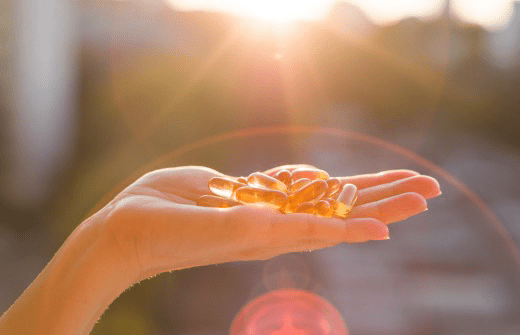Vitamin K2 is needed to build strong and healthy bones and according to scientific studies [1], it is also involved in maintaining a healthy cardiovascular system. We speak about this vitamin very often both in our podcasts and in our blog articles. From our point of view, vitamin K2 is an underestimated nutritional substance. In this article you will learn why we need vitamin K2 and what forms and sources of vitamin K2 we use in Trime.
Article at a glanc:
- Vitamin K types and functions
- Vitamin K2 and statins
- Vitamin K2 deficiency in the majority of the population?
- Don't forget to supplement vitamin K2 also during summer
- Trime vitamin K2 - natural sources and high bioavailability
- All-trans vs cis-configuration: different biological activity
Vitamin K types and functions
It is necessary to distinguish between different types of vitamin K, which play different roles in the human body. Vitamin K is a fat-soluble substance and includes vitamin K1 (phylloquinone), derived from plant sources, which plays a key role in blood clotting, vitamin K2 (menaquinone), and synthetic vitamin K3 (menadione).
The function of K vitamins is unique among other vitamins. They activate proteins produced by various organs of our body. Vitamin K1 activates clotting factors in the liver and thus ensures blood clotting.
Vitamin K2 activates osteocalcin in bones and matrix Gla protein (MGP) in the vascular system. These proteins help bind calcium to the bones and prevent calcium deposition in blood vessels.
Another protein whose activation is dependent on vitamin K2 is Gas6. This protein was discovered only in 1993 and can be found for example in heart, lungs, stomach, kidneys and cartilage. [2] Gas6 is involved in the regulation of cell growth, promotes cell adhesion, cell proliferation and prevents apoptosis.
Vitamin K2 and statins
Statins are among the most commonly prescribed drugs designed to lower LDL cholesterol levels and their use has been on the rise in recent decades. It is also widely known that statins deplete the human body of coenzyme Q10, an antioxidant that helps create energy in the mitochondria. Patients taking statins are therefore recommended to supplement coenzyme Q10. A study from 2015 [3] states that statins can act as mitochondrial toxins and can have a negative effect on the heart and vascular system not only due to the depletion of coenzyme Q10, but also due to the inhibition of the synthesis of vitamin K2, which protects blood vessels from calcification. However, there are currently no recommendations for vitamin K2 supplementation for patients taking statins.
Vitamin K2 deficiency in the majority of the population?
Today's recommendations for vitamin K intake refer only to vitamin K1 in relation to the requirements for ensuring adequate blood clotting and preventing excessive bleeding. EFSA considers the daily intake of vitamin K1 to be 1 mcg per 1 kg of body weight for both sexes and all age categories.
However, there are no intake recommendations for vitamin K2. The human body partially synthesizes vitamin K2 from vitamin K1, but this synthesis is limited, as is the synthesis of vitamin K2 by intestinal bacteria. Therefore it is necessary to ensure a regular dietary intake of vitamin K2.
We can get vitamin K2 from our diet from fermented foods, with natto being one of the richest sources. Vitamin K2 is also found in dairy products in grass-fed quality. But who regularly has natto or cheese in grass-fed quality in their diet? It is therefore obvious that it is not easy to ensure a sufficient intake of vitamin K2 only from the diet. For this reason, it is assumed that the majority of the population suffers from a vitamin K2 deficiency which can lead to weaker bones, increase the risk of bone loss and due to the accumulation of calcium in soft tissues can contribute to the development of heart diseases, including heart attack. That’s why we recommend ensuring an adequate intake of vitamin K2 through dietary supplements.
Don't forget to supplement vitamin K2 also during summer
Vitamin K2 is thanks to its ability to regulate calcium deposition often included in vitamin D supplements. During winter many people supplement vitamin K2 in blends together with vitamin D3. As we increase vitamin D levels naturally by exposing our skins to the sun during summer, the consumption of D3K2 products decreases. However, the need for vitamin K2 remains, which is why we should not forget about its supplementation. You can just change the D3K2 mixture for separate vitamin K2 in capsules.
Trime vitamin K2 - natural sources and high bioavailability
Trime offers natural sources of vitamin K2 in the biologically active form of MK-7, which has a longer half-life and thus higher bioavailability. All of our vitamin K2 supplements contain no allergens and are suitable for vegetarians and vegans.
Vitamin K2 in capsules is obtained naturally by a patented bio-fermentation process from chickpea and you can find it in both products Vitamin K2 80 mcg and in the multivitamin Daily F20 Complex.
The product D3K2 in drops or the children's supplement Kids DHA+D3K2 contain vitamin K2 obtained by the method of natural fermentation of soy protein. We also refer to these supplements as "allergen free" because they do not contain soy, but the purified MK-7 molecule. The process of natural fermentation is also important as it can generally reduce the likelihood of an allergic reaction.
All-trans vs cis-configuration: different biological activity
At the same time, all our K2 supplements are found in the all-trans configuration, which represents a biologically active form capable of activating K2-dependent proteins. On the other hand, cis-configuration has reduced activity or may be biologically inactive.
All-trans- or cis-configuration refers to a different molecular geometry (molecular size and shape), which in turn determines the solubility and ability of menaquinones to fit into cellular structures. Because of the altered shape of cis-isomers, they may not "fit" where they are supposed to, leaving K2-dependent enzymes and proteins inactivated.
Sources:
[1] Geleijnse JM, Vermeer C, Grobbee DE, Schurgers LJ, Knapen MH, van der Meer IM, Hofman A, Witteman JC. Dietary intake of menaquinone is associated with a reduced risk of coronary heart disease: the Rotterdam Study. J Nutr. 2004 Nov;134(11):3100-5. doi: 10.1093/jn/134.11.3100. PMID: 15514282.
[2] Ferland G. The vitamin K-dependent proteins: an update. Nutr Rev. 1998 Aug;56(8):223-30. doi: 10.1111/j.1753-4887.1998.tb01753.x. PMID: 9735675.
[3] Okuyama H, Langsjoen PH, Hamazaki T, Ogushi Y, Hama R, Kobayashi T, Uchino H. Statins stimulate atherosclerosis and heart failure: pharmacological mechanisms. Expert Rev Clin Pharmacol. 2015 Mar;8(2):189-99. doi: 10.1586/17512433.2015.1011125. Epub 2015 Feb 6. Erratum in: Expert Rev Clin Pharmacol. 2015;8(4):503-5. PMID: 25655639.

















